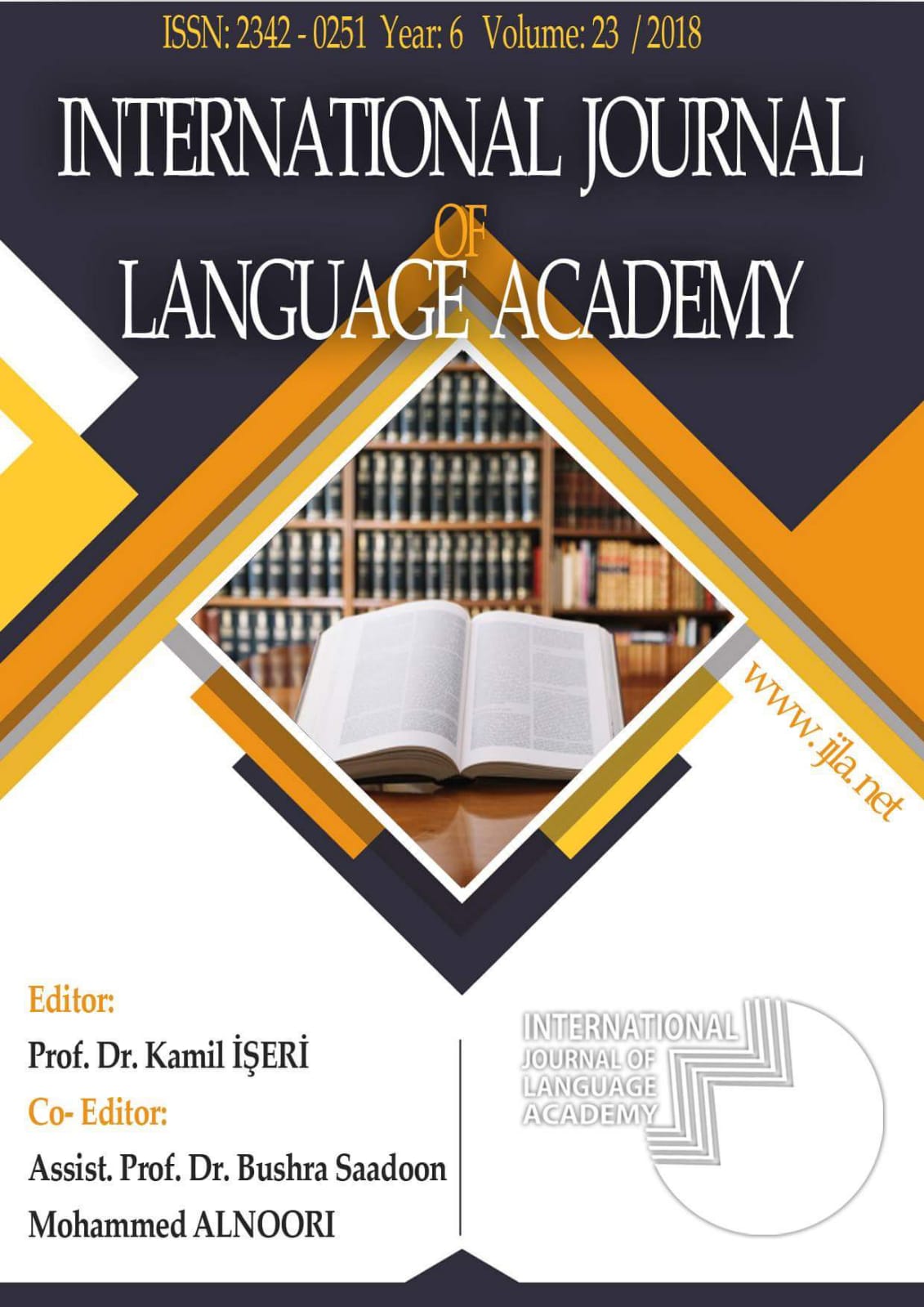TÜRKÇE, İNGİLİZCE VE ALMANCA ATASÖZLERİ VE DEYİMLERDE ENGELLİLERLE İLGİLİ İFADELERİN KÜLTÜRLER ARASI İNCELEMESİ
Author :
Abstract
Tarihsel açıdan bakıldığında eski çağlardan günümüze kadar engelli insanların, dünyanın her yerinde olduğu gibi, Türk, İngiliz ve Alman toplumlarında da hiyerarşik yapının en alt basamağında yer aldıkları görülmektedir. Engellilik olgusuna ve engelli insanların içerisinde bulundukları olumsuz konumlarına yönelik tüm çalışmaların önemli ve gerekli olduğu düşünülerek, bu çalışmayla Türkçe, İngilizce ve Almancada yer alan, “kör, sağır, dilsiz, topal, deli” gibi fiziksel ve zihinsel engellilik ile ilgili ifadeler içeren kalıp sözler incelenmiştir. Araştırmanın yönteminde ele alınan engellilik ifadeleri Türkçe, İngilizce ve Almanca dillerindeki örnekleri ile sunulmuş, ve her ifadenin yer aldığı dildeki karşılığı diğer iki dildeki karşılıkları ile tam, kısmen ve sıfır eşdeğerlik değerleri üzerinden saptanmaya çalışılmıştır. Bu sözlükbilim çalışmasıyla incelenen atasözü ve deyimlerin stilistik açıdan genelde tek cümleden oluştuğu ve mecazlı anlam bildirdiği ortaya konulmuştur. Ayrıca, incelenen ifadelerde engellilik olgusunun bedensel ifadelerede zihinsel ifadelere oranla daha fazla kullanıldığı tespit edilmiştir. İngilizce, Almanca ve Türkçe atasözleri ve deyimler temel alınarak, üç kültürün engellilik olgusuna dilsel yaklaşımları karşılaştırılmış, genelde toplum-bilişsel, özelde dil eğitimi ve çeviribilime yansımaları ile alana kültürlerarası geçerlilik açısından katkı sağlaması amacıyla incelenmiştir.
Keywords
Abstract
From a historical perspective, the disabled are considered at the bottom level of social hierarchy. This can be deduced from the occurring proverbs in Turkish, English and German but also from proverbs available in the rest of the world. The stereotypes including expressions related to physical and mental disability such as blind, deaf, dumb, lame, mad in Turkish, English and German were investigated within the scope of this study by considering the importance and necessity of several studies related to the disability and the negative positions that the disabled are in. The disability expressions examined in this research were presented with examples from Turkish, English and German languages. These retrieved expressions were attempted to be coded with the corresponding answers through cross-linguistic examination on the basis of three equivalence values; exact, partial and none. This lexicographical study revealed that the examined proverbs and idioms were used in single sentences and implied figurative meanings in terms of stylistics. In addition, it was found that the disability cases were more frequently used within physical expressions than the mental expressions. Based on the proverbs and idioms of English, German and Turkish, the linguistic approaches of these three cultures were compared and reflections of socio-cognitive in macro-level, and language education and translation in micro-level were presented in an attempt to contribute to the field in cross-cultural soundness.
Keywords
- Ahanov, K. (2008). Dilbilimin Esasları (çeviren Murat Ceritoğlu); Türk Dil Kurumu Yayınları, Ankara
- Aksan, D. (1982a). Dilbilim Seçkisi, Türk Dil Kurumu Yayınları, Ankara
- Aksan, D. (1982b). Her Yönüyle Dil, Ana Çizgileriyle Dilbilim, Cilt 3, Türk Dil Kurumu Yayınları. Ankara
- Aksan, D. (1987). Her Yönüyle Dil, Ana Çizgileriyle Dilbilim, Cilt 1, Türk Dil Kurumu
- Aksoy, Ö.A. (1971). Atasözleri ve Deyimler Sözlüğü; Ankara Üniversitesi Basımevi, Ankara
- Aksoy, Ö. A. (1993). Atasözleri Ve Deyimler Sözlüğü. 8. Baskı, (Cilt I /II), İnkılap Kitabevi, İstanbul
- Almanca Atasözleri ve Deyimler (2014). Almanca Online Atasözleri ve Deyimler Sözlüğü içinde. Erişim adresi: https://www.phrasen.com Erişim tarihi: 03.04.2014
- Ateş, T. (2000), Açıklamalı Atasözleri Sözlüğü, Esen Yayınları, İstanbul.
- Bezmen, S., Brown, C. H. (Hazırlayan) (2013) English-Turkish / Turkish-English Dictionary (İngilizce-Türkçe/ Türkçe-İngilizce Sözlük, Redhouse Yayınları, SEV Yayıncılık
- Blanco, C. M. (2010). Intensivierung durch Vergleich im Deutschen und Spanischen: Eine Strukturen- und Bedeutungsanalyse. In Foeldes, C. (Hrsg.): Phraseologie disziplinar und interdisziplinaer. Narr Verlag. Tuebingen. S. 465-476.
- Francis, B. (ed.) (2006). Oxford Idioms: Dictionary for learners of English., New York, NY:
- Goethe, W. (yorumlayan: Erich Trunz) (1986). Faust. Der Tragödie erster und zweiter Teil. Urfaust. C.H.Beck Verlag, München.
- Helomaa, S. (2014). Sprichwörter in drei Sprachen: Deutsch-Französisch-Finnisch. Eine kontrastive Studie., s.16’da atıfta bulunulan kaynak: Matti Kuusi/ Lauhakangas (1978:11) Johdanto. In: Kari Laukkanen ja Pekka Hakamies: Sananlaskut.Vaasa:SKS.(https://helda.helsinki.fi/bitstream/handle/10138/446 88/helomaa_väitöskirja.pdf)
- Humboldt, V. H. (1949). Über die Verschiedenheit des menschlichen Sprachbaues und ihrem Einfluss auf die geistliche Entwicklung des Menschengeschlechts, hrsg. H.v.Nette, Darmstadt
- İngilizce Deyimler (2014). The Phrase Finder içinde. Erişim adresi: https://www.phrases.org.uk/index.html Erişim tarihi: 03.04.2014
- İngilizce-Türkçe Deyimler (2014). İngilizce-Türkçe Deyimler Sözlüğü içinde. Erişim adresi: http://www.turktrans.net/idioms/ Erişim tarihi: 03.04.2014
- Korhonen, J. (2007). Probleme der kontrastiven Phraseologie. In: Burger, Harald et f.: Phraseologie. Ein internationales Handbuch der zeitgenössischen Forschung. Band 1. Walter de Gruyter. Berlin (S: 530-573)
- Lilli, W. (1978). Grundlagen der Stereotypisierung. Verlag für Psychologie Hogrefe. Göttingen ISBN: 9783801701789
- MEB (1992), Türk Atasözleri ve Deyimleri Cilt I-II, (Haz: Milli Kütüphane Genel Müdürlüğü) Araştırma İnceleme Dizisi, No:2174 - 2175
- Özafşar, S. (2015). Atasözleri Sözlüğü - Deyimler Sözlüğü; İstanbul: Tomurcuk Yayınevi.
- Pala, İ. (2003). Atasözleri Sözlüğü, Yayın no 5. İstanbul: L&M kitapları.
- Redensarten-Index (2014). Almanca Online Atasözleri ve Deyimler Sözlüğü içinde. Erişim adresi: https://www.redensarten-index.de/suche.php Erişim tarihi: 03.04.2014
- Scholze-Stubenrecht, W., Haller-Wolf, A. (Ed.) (2013). Duden: Redewendungen.
- Steuerwald, K. (1983) (Deutsch-Türkisches/ Türkisch-Deutsches Wörterbuch (Türkçe-
- Türkçe Atasözleri ve Deyimler (2014). Türk Dil Kurumu Online Atasözleri ve Deyimler Sözlüğü içinde. Erişim adresi: http://www.tdk.gov.tr/index.php?option=com_atasozleri&view=atasozleri Erişim tarihi: 03.04.2014
- Wahrig, G. (2000). Wahrig. Deutsches Wörterbuch. Leitung der Neuausausgabe v. R. Wahrig-Burfeind Gütersloh.
- Wehmeier, S. (Ed.) (1996). Oxford Wordpower Dictionary, 10th edition, New York, NY:
- Wenzel, A. (1978). Stereotype in gesprochener Sprache. Form, Vorkommen und Funktion in Dialogen, Max Hueber Verlag, München.





